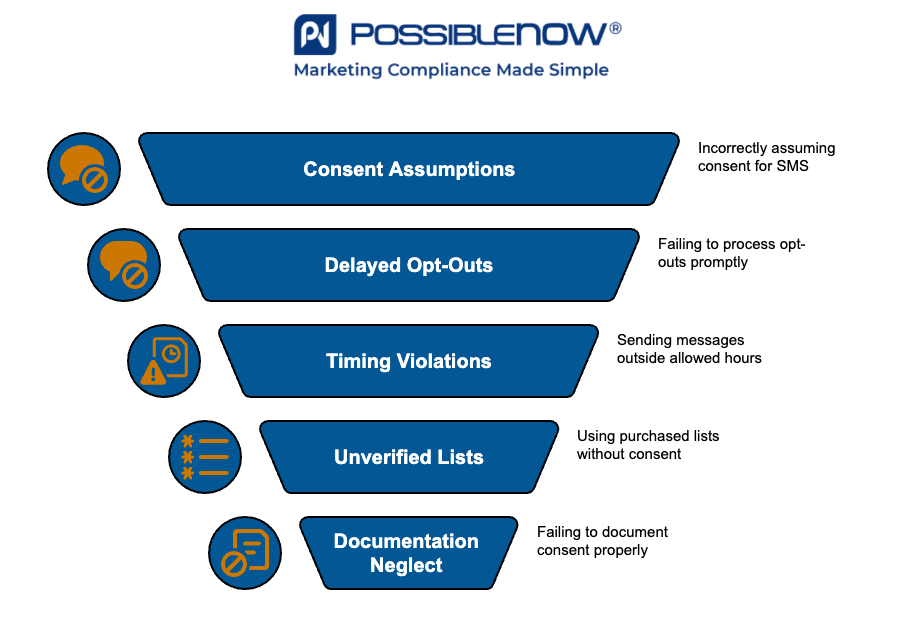Resource Center
10 Do Not Contact Rules for SMS and Text Messaging
Type: Blog
Topic: Do Not Call Solution

Text messaging is one of the fastest and most effective ways to reach customers, but it’s also one of the most heavily regulated. Whether you’re using SMS for marketing campaigns, appointment reminders, or customer support, your business must comply with strict Do Not Contact (DNC) rules.
Regulations like the Telephone Consumer Protection Act (TCPA) and the FTC’s Telemarketing Sales Rule (TSR) impose clear requirements on how and when you can send texts. These rules are designed to protect consumers from unwanted contact, and violations can lead to steep fines, blocked messages, or reputational damage.
In the following sections, you’ll find information on:
Speak With an Expert Today
Here are 10 essential rules your team must follow to stay compliant when texting customers or prospects.
Obtain Prior Express Written Consent
You must receive clear, documented permission from the recipient before sending any promotional or marketing texts. This consent must be written, unambiguous, and specific to text messaging.
Honor National Do Not Call Registry Rules
Text messages are treated like phone calls under the TCPA. If a number is listed on the National Do Not Call Registry, you cannot send marketing texts unless the person has provided consent.
Maintain an Internal DNC List
Businesses must maintain their own Do Not Contact list to track individuals who opt out. These preferences must be honored for at least five years, in compliance with the Telemarketing Sales Rule (TSR).
Respect Opt-Out Requests Immediately
When a recipient replies “STOP” or uses another recognized opt-out command, you must cease messaging right away. One confirmation message is allowed, but no further marketing content should follow.
Record and Track Consent
Always log when and how consent was obtained. This includes timestamps, opt-in language used, and the channel where consent was given. Documentation is essential for audit defense.
Time-of-Day Restrictions Apply
Marketing texts should only be sent between 8 a.m. and 9 p.m. in the recipient’s local time zone. Sending messages outside this window can result in non-compliance penalties.
No Shared or Purchased Lists Without Verified Consent
You cannot send texts to contacts from third-party or purchased lists unless you have verifiable, written proof that those individuals consented to receive messages from your business.
Clearly Identify the Sender
Every message must include your business name and a method for the recipient to contact you. This helps recipients recognize who is reaching out and supports transparency.
Differentiate Between Transactional and Marketing Messages
Transactional texts (e.g., order confirmations or appointment reminders) do not require the same level of consent as marketing texts. However, any promotional content must meet TCPA standards.
Comply With State-Specific Laws
Some states, such as Florida and California, have their own DNC and consent rules that go beyond federal requirements. Businesses must monitor and comply with these additional obligations.
Common Mistakes That Lead to SMS Compliance Failures

Even well-intentioned teams can make costly errors when they overlook the specifics of text messaging regulations. Some of the most frequent mistakes include:
- Assuming consent for email or calls applies to SMS
- Failing to act on opt-outs in real time
- Sending messages outside the allowed time window
- Using purchased or third-party lists without valid proof of consent
- Neglecting to scrub contact lists regularly
- Omitting sender identification or opt-out instructions
- Not documenting how and when consent was obtained
Each of these errors can lead to serious consequences, including fines, litigation, and lost customer trust.
How to Stay Compliant at Scale
Managing compliance manually is difficult, especially when teams operate across departments, systems, and channels. Automating SMS suppression and consent tracking is essential for reducing risk and maintaining speed.
PossibleNOW offers solutions designed to keep you compliant without slowing down your outreach:
- DNCSolution® provides real-time list scrubbing across national, state, and internal DNC lists before a text ever goes out.
- Our TCPA compliance tools help document consent, monitor opt-outs, and generate audit-ready logs.
- MyPreferences® centralizes opt-in and opt-out management across SMS, email, and voice, providing consistency across all touchpoints.
With the right tools, your team can scale outreach confidently while staying on the right side of the law.
Request a Demo Today
About PossibleNOW
PossibleNOW is the pioneer and leader in customer consent, preference, and regulatory compliance solutions. We leverage our MyPreferences technology, processes, and services to enable relevant, trusted, and compliant customer interactions. Our platform empowers the collection, centralization, and distribution of customer communication consent and preferences across the
enterprise. DNCSolution addresses Do Not Contact regulations such as TCPA, CAN-SPAM and CASL, allowing companies to adhere to DNC requirements, backed by our 100% compliance guarantee.
PossibleNOW’s strategic consultants take a holistic approach, leveraging years of experience when creating strategic roadmaps, planning technology deployments, and designing customer interfaces. PossibleNOW is purpose-built to help large, complex organizations improve customer experiences and loyalty while mitigating compliance risk.
-
TCPA Regulations and Compliance: Complete Guide
Type: Blog
Topic: Do Not Call Solution
-
Defining Meaningful Metrics: 6 Soft KPIs to Measure Customer Preference Collection
Type: Blog
Topic: Preference Mgmt
-
Email Preference Center Best Practices
Type: Blog
Topic: Preference Mgmt
-
The Basics of DNC Scrubbing: What Is a Do Not Call (DNC) Scrubber and Why Do You Need It?
Type: Blog
Topic: Do Not Call Solution
-
What is Consent Management, How it Works, & Why it’s Important for Data Compliance
Type: Blog
Topic: Consent Mgmt
-
Do Insurance Companies Cover TCPA Damages?
Type: Blog
Topic: Do Not Call Solution
-
8 Best Practices for Capturing GDPR Consent
Type: Webinars
-
Data Silos Cause Communication Gaps
Type: Videos
Topic: Preference Mgmt
-
Difference Between Preferences & Consent
Type: Videos
Topic: Preference Mgmt
-
Integrate Do Not Call Compliance with Preferences
Type: Videos
Topic: Preference Mgmt
-
Customer Preferences Require More Than One Flavor
Type: Videos
Topic: Preference Mgmt
-
Give Customers Opt-Down Options
Type: Videos
Topic: Preference Mgmt
-
Preference Center Organization
Type: Videos
Topic: Preference Mgmt
-
Strategic Consultants Benefited Scotiabank
Type: Videos
Topic: Industry Testimonials
-
Best Practices for Managing Do Not Email Lists
Type: Blog
Topic: Do Not Call Solution
-
How Do Not Call Rules Apply to Nonprofit Organizations
Type: Blog
Topic: Do Not Call Solution
-
How to Train Your Call Center on DNC Rules
Type: Blog
Topic: Do Not Call Solution
